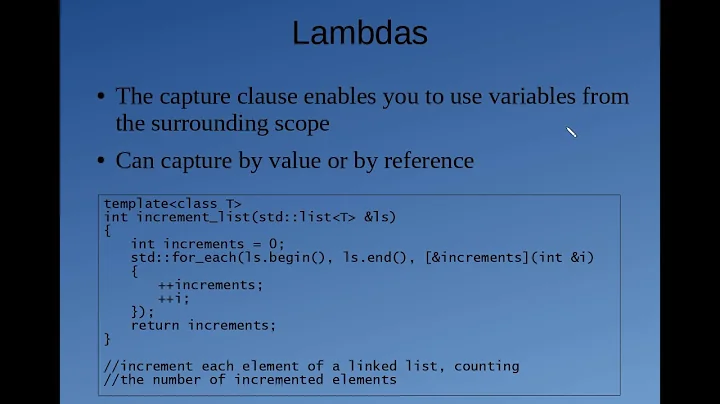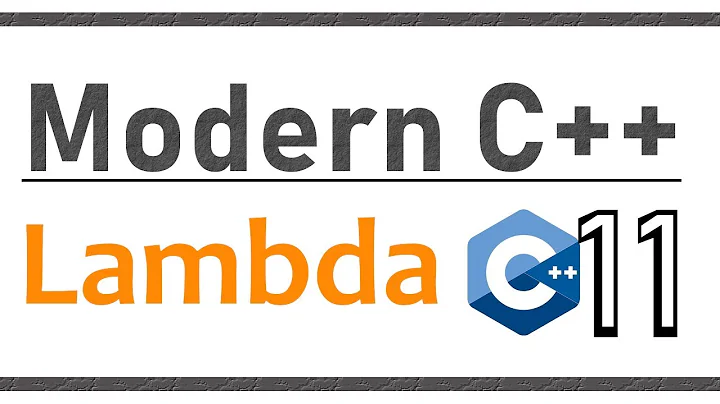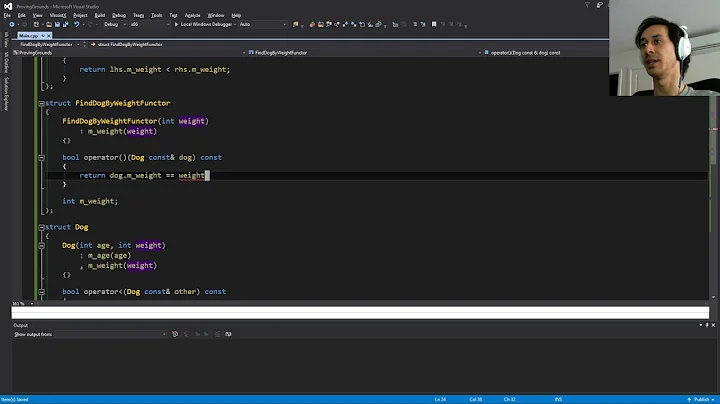C++11 lambda function - how to pass parameter
Solution 1
Show lambda with parameters are used? How to pass parameters to them?
It works exactly like with any other type of callable object:
#include <iostream>
int main()
{
auto l = [] (int i) { std::cout << "The answer is " << i; };
l(42);
}
Also notice, that you do not need to store a lambda in a variable in order to invoke it. The following is an alternative way to rewrite the above program:
#include <iostream>
int main()
{
[] (int i) { std::cout << "The answer is " << i; } (42);
// ^^^^
// Invoked immediately!
}
The type of a lambda function (the so-called "lambda closure") is defined by the compiler, and is a functor with a call operator whose signature is the one you specify when defining the lambda. Therefore, you call a lambda exactly as you would call a functor (i.e. exactly as you would call a function - or any callable object).
Thus, if you want to assign a lambda to an object, the best practice is to let the compiler deduce its type by using auto. If you do not want or cannot use auto, then you may:
Use function pointers for non-capturing lambdas (capturing lambdas are not convertible to function pointers). In the above case, thus, the following will also work:
#include <iostream> int main() { void (*f)(int) = [] (int i) { std::cout << "The answer is " << i; }; f(42); }Use
std::function(this is always possible, even if the lambda is capturing):#include <iostream> #include <functional> int main() { std::function<void(int)> f = [] (int i) { std::cout << "The answer is " << i; }; f(42); }
Solution 2
auto lambda = [] (int a, int b) { return a + b; };
assert(lambda(1, 2) == 3);
Solution 3
You don't even need a variable to hold your lambda -- you can call it directly:
std::cout << [](int n) { return n + 1 ; } (99) << std::endl ;
Related videos on Youtube
Littlebitter
Updated on December 07, 2020Comments
-
Littlebitter over 3 years
I used lambda function to pass it to
std::condition_variablewait() function, but that is not the case. I use lambda functions that don't receive any parameters, and everything is absolutely clear for me. But I totally don't understand how is used lamdba function that have parameters list. Show lambda with parameters are used? How to pass parameters to them?-
 chris about 11 yearsAny resource you find on lambdas will explain how to make them take parameters.
chris about 11 yearsAny resource you find on lambdas will explain how to make them take parameters. -
Littlebitter about 11 years@chris I know hpw to make then take parameters - [](int parameter) {lambda body}, but show will I use this lambda?
-
 chris about 11 yearsJust like a function.
chris about 11 yearsJust like a function. -
Littlebitter about 11 years@chris I was confused that lamdba has no name, answers below helped me
-
-
Littlebitter about 11 yearsahha! and here auto hides int(*p)(int, int)?
-
 Admin about 11 years@Littlebitter the type of lambdas is implementation-defined, hence you need
Admin about 11 years@Littlebitter the type of lambdas is implementation-defined, hence you needauto. You can convert some lambdas (those that don't capture anything) to function pointers, but that's not their actual type (similar to how you can convert anintto along, but anintis not along). -
Littlebitter about 11 yearsand if lambda will be [] (int a, int b) -> int { return a + b; }; it will be possible to create pointer to function variable with type I described, without auto?
-
 chris about 11 yearsI'm pretty sure all lambdas are storable in
chris about 11 yearsI'm pretty sure all lambdas are storable instd::function, aren't they? And @Littlebitter, Assigning that to the type in your first comment will work because it doesn't capture anything. -
 Admin about 11 yearsYes, you can do
Admin about 11 yearsYes, you can doint (*lambda)(int, int) = [] (int a, int b) { return a + b; }, since the lambda doesn't capture any variables.








